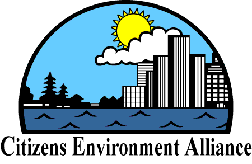

| July 13, 2001 |
| FOR IMMEDIATE RELEASE |
Windsor, Ontario - The Citizens Environment Alliance has requested that the Michigan Department of Environmental Quality (MDEQ) reject a permit to build yet another incinerator in Detroit. "We've got to end southeast Michigan's love affair with incinerators," said Shawn Hupka President of the Citizens Environment Alliance. The Alliance is a bi-national organization with members in both metro-Detroit and Windsor, Ontario.
Minergy Detroit, LLC, the proponent of the new incinerator, has suggested that this will be a less polluting facility than the one that currently burns Detroit's municipal wastewater sludge. Consider:
In its submission, the Citizens Environment Alliance wrote: The MDEQ has stated that the best available pollution control technology is not cost effective. It is unacceptable that public health impacts are "acceptable risks" while diminished profit, the result of best available control technology, is the deciding factor for the use of carbon injection controls. That this position is promulgated by a state environmental regulatory agency is unconscionable.
"If the MDEQ doesn't prevent this environmental disaster, we'll be looking at other options that will help to protect public health and our environment," said Hupka. "In the least, the US Environmental Protection Agency and Environment Canada need to investigate and take action."
Letter enclosed.
For more information contact:
Shawn Hupka
Executive Director, Citizens Environment Alliance
(519) 973-1116
July 13, 2001
Ms. Lynn Fiedler
Permit Section Supervisor
Michigan Department of Environmental Quality (MDEQ)
Air Quality Division (AQD)
P.O. Box 30260, Lansing
Michigan, 48909
Telephone: (517) 373-2856
Fax: (517) 373-1265
Ms. Fiedler,
Re: Minergy Detroit LLC, Detroit Michigan - Proposed Permit Number 175-00
The Citizens Environment Alliance of southwestern Ontario & southeast Michigan (CEA) has concerns with the proposed permit for the Minergy Detroit LLC Sewage Sludge Incinerator. Issuing this permit is not in the best interest of the residents southwestern Ontario nor southeast Michigan; the permit application should be dismissed.
The CEA views all new sources of persistent toxic substances to the Detroit River Area of Concern (AOC) as a violation of the General Principles of Annex 12 of the Great Lakes Water Quality Agreement: "the philosophy adopted for control of inputs of persistent toxic substances shall be zero discharge ..." Specific emissions of concern include lead, mercury and dioxin.
In a United States Environmental Protection Agency (US-EPA) draft plan entitled Great Lakes 2001: A Plan for the New Millennium, the EPA has established a target for a 50% reduction nationally in the release of mercury from sources resulting from human activity. The EPA also established a target for 75% reduction nationally in total releases of dioxins and furans from sources resulting from human activity. Permitting the Minergy Detroit LLC Sewage Sludge Incinerator will certainly impede the achievement of these goals.
Since Detroit wastewater sewage has not been test-burned in a facility similar to the one proposed by Minergy, the pollution control data provided to the public is dubious. The data that has been submitted in MDEQ-AQD documents also lacks context. For example, mercury already is a contaminant of concern in the Detroit River AOC. Yet assurances are made in the MDEQ Questions and Answers Document (dated June 28, 2001) that allowing this facility to emit mercury and other persistent toxic substances will not significantly add to the environmental degradation of the Detroit River AOC. This contention is beyond rational belief.
The Questions and Answers Document prepared by the MDEQ-AQD also focuses on the potential impacts of mercury contamination to the Lake St. Clair recreational fishery, ignoring the recreational fishing that occurs throughout the Detroit River and western basin of Lake Erie. Certainly, prevailing wind patterns will ensure that mercury emissions will have a geographic impact beyond Lake St. Clair.
Further, the Questions and Answers Document also states that the best available pollution control technology is not cost effective (Best Available Control Technology-3.) It is unacceptable that public health impacts are "acceptable risks" while diminished profit, the result of best available control technology, is the deciding factor for the use of carbon injection controls. That this position is promulgated by a state environmental regulatory agency is unconscionable.
To summarize, contentious issues include:
Not only does the permit allow for unacceptable emissions of toxic pollutants, it invites Minergy to import wastewater sludge from surrounding municipalities. Possible sludge "importation" coupled with no commitment to decommission the existing Detroit wastewater sludge incinerator implies that incinerators are seen as a welcome industry in southeast Michigan; they are not!
The permit process is far too myopic to consider the context in which the Minergy proposal exists. However, the CEA does expect the MDEQ, as well as all signatories, to abide by the principles of the Great Lakes Water Quality Agreement. As such, the MDEQ must reject this permit proposal.
Sincerely,
Shawn Hupka
President
cc.
Kim Ferguson, Supervisor, Ontario Ministry of Environment, Windsor Ontario
Telephone: (519) 254-7098 ~ Fax: (519) 254-5894
Robert Miller, Section Chief Michigan Permitting Section, United States Environmental Protection Agency, Region Five Air and Radiation Division, Chicago Illinois
Telephone: (312) ~ Fax: (312) 886-0617
Esther Bobet, Manager, Air & Inventories Division, Environment Canada, Ontario Region Environmental Protection Branch, Downsview Ontario
Telephone: (416) 739-5880 ~ Fax: (416) 739-4251